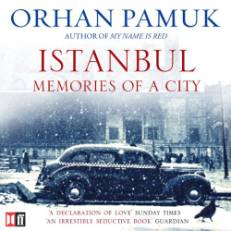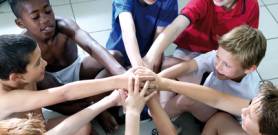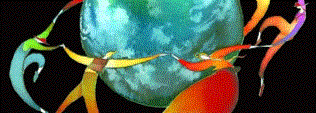

"Ho trascorso la mia vita ad Istanbul, sulla riva europea, nelle case che si affacciavano sull'altra riva, l'Asia. Stare vicino all'acqua, guardando la riva di fronte, l'altro continente, mi ricordava sempre il mio posto nel mondo, ed era un bene. E poi, un giorno, e' stato costruito un ponte che collegava le due rive del Bosforo. Quando sono salito sul ponte e ho guardato il panorama, ho capito che era ancora meglio, ancora piu' bello di vedere le due rive assieme. Ho capito che il meglio era essere un ponte fra due rive. Rivolgersi alle due rive senza appartenere"
Oran Pamuk, Istanbul, 2003


"I have spent my life in Istanbul, on the European coast, in the houses that faced the other coast, Asia. Staying near the water, watching the facing coast, the other continent, always reminded me of my place in the world, and that was good.And then one day they built a bridge that linked the two coasts of the Bosporus. When I went on the bridge and I watched the landscape, I realized it was even better, it was nicer to see the two coasts together. I realized the best was to be a bridge between two coasts. To look at both of them without belonging"
Oran Pamuk, Istanbul, 2003

Occorre evitare l'aprioristica esaltazione del diverso. Gli altri non sono ne' migliori ne' peggiori: sono semplicemente diversi (come noi). "Abbandonarsi" alla diversita' e' altrettanto pericoloso che negarla o rifiutarla.E' necessario invece recuperare la COMPLESSITA'. Non negare l'identita', non esaltare ne' distruggere l'alterita', individuare compromessi accettabili: ecco tre indicazioni per una sintesi autentica.
We need to avoid the a priori exaltation of the different . The others are neither better nor worse. They are simply different (as we are). Losing ourselves in diversity is as dangerous as denying it or refusing it.It is instead necessary to get back COMPLEXITY . Not denying identity, not exalting or destroying differences, individuating acceptable compromises: here are three tips for an authentic synthesis.
Solo attraverso un continuo e paziente lavoro di mediazione e di aggiustamento reciproco possiamo sperare di riuscire a coesistere e a miglioraci a vicenda. Sta a noi cercare di volta in volta un possibile e provvisorio equilibrio garantito dalla definizione e dal rispetto di alcuni elementari e prioritari diritti, riuscire ad ammorbidire la nostra identita' senza perderla, trovare uno spazio etico minimo in cui sia possibile agire tra il rispetto dell'altro e la coscienza di se'.
It is only through a continuous and patient activity of mediation and reciprocal adjustment that we can hope to be able to coexist and to get better helping one another. It is up to us to look time after time for a possible and temporary balance granted by the definition and by the respect of some elementary and a priori rights, to be able to soften our identity without losing it, to find an ethical minimum space in which it can be possible to act between the respect of the other and the conscience of the self.
"Le voci dell'altro", di M. Antonello, P. Eramo, M. Polacco

Accettare il diverso e' faticoso e difficile, a volte anche rischioso. L'altro ostacola il nostro desiderio di tranquillita', ci mette in discussione, ci crea dei problemi, puo', al limite, rappresentare un effettivo pericolo. Ma nel bene e nel male siamo "condannati" a convivere. Per fare spazio alla diversita', occorre in primo luogo un "arretramento" della nostra identita'. Sospendere le nostre certezze, smascherare i pregiudizi e le ottusita' nascoste nei luoghi comuni piu' scontati, mettere in discussione conoscenze, valori e istituzioni, relativizzare il nostro punto di vista, dare spazio anche a cio' che non e' come noi.
Accepting the different is harsh and difficult, sometimes dangerous too. The other interferes with our wish of quietness, questions us, makes things difficult for us, can even represent a real danger. But for better or for worse we are condemned to live together. To make room for diversity first of all our identity needs to go back.Suspending our certainties, revealing prejudice and limitations hidden in the most obvious stereotype, questioning knowledge, values and institutions, limiting our point of view, making room for what is not like us as well.
Relativizzare il nostro punto di vista puo' anche significare distruggere e disorientare. Rimanere senza volto e senza radici e' altrettanto, se non maggiormente, pericoloso che custodire gelosamente la propria immagine. Bisogna agire dunque con cautela, mettere in crisi ma con delicatezza, stimolare le possibilita' interne di trasformazione senza pretendere impossibili capovolgimenti: l'identita' non e' un blocco statico ma un aggregato dinamico che puo' trasformarsi, divenire, assorbire gli stimoli esterni, assumere infinite forme di volta in volta diverse.
Limiting our point of view can also mean destroying and confusing. Staying without a face or roots is as (if not more) dangerous as jealously keeping our image.Then we need to act cautiously, to cause problems but softly, to stimulate the internal possibilities of transformation, without expecting impossible capsizing: identity is not a static block but a dynamic aggregation which can transform itself, become, absorb external stimuli, take on infinite shapes, every time different.
"Le voci dell'altro", di M. Antonello, P. Eramo, M. Polacco